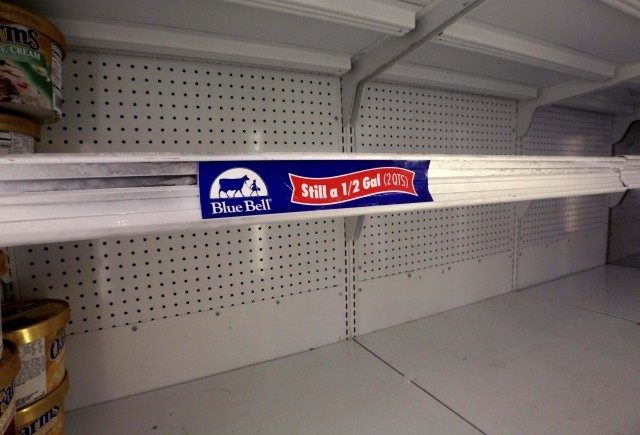It could be a long hot summer in Texas without Blue Bell Ice Cream.
Company CEO Paul Kruse released a statement on Thursday saying that it would be “several months at a minimum” before Blue Bell is back in stores. Earlier, the company estimated it would be only a few weeks before their products returned.
The statement goes on to say Blue Bell facilities “remain closed indefinitely as it cleans and sanitizes them.”
This follows the release of a comprehensive report from the Food and Drug Administration citing contamination and processing problems at the home creamery in Brenham, as well as plants in Oklahoma and Alabama. The report alleges Blue Bell knew about the problem in 2013, but did not take steps to prevent additional contamination.
Contamination of the plant in Broken Arrow, Oklahoma, brought listeria to Blue Bell products, allegedly killing three people in Kansas earlier this year. In addition to the three deaths, there were seven other illnesses reportedly linked to Blue Bell ice cream in Kansas, Texas, Oklahoma and Arizona.
Blue Bell is sold in 23 states, ranking as the third-best-selling ice cream line in America.
The Associated Press story continues: “The Food and Drug Administration on Thursday released results of its investigations into Blue Bell’s plants in Oklahoma, Texas and Alabama after a Freedom of Information request by The Associated Press. The most extensive violations were found in Oklahoma, where the FDA listed 17 positive tests for listeria on equipment and around its plant there from March 2013 through February 2015.”
Neither Blue Bell nor the FDA has explained why the Oklahoma plant was not closed after repeated discoveries of listeria – not in the food itself, but in multiple locations around the plant. Blue Bell said it cleaned the affected areas, but FDA report found those sterilization procedures were not adequate.
The plant in Broken Arrow, just southeast of Tulsa, has been operational since 1992. The Alabama facility is located in Sylacauga, about 45 miles southeast of Birmingham. It opened in 1996.
The AP provides details from the FDA inspection: “Violations in the Oklahoma plant include dirty equipment, inadequate food storage, food being held at improper temperatures and employees not washing hands appropriately, according to the report. Employees wore dirty shoes in the plant and soiled, porous wood pallets were used for ingredient storage and transportation. The FDA also said the company did not do enough testing for possible food contamination.”
Violations were also reported at the Texas and Alabama plants. In Alabama, FDA investigators observed at least two employees working close to the food while wearing dirty clothing. In Texas, investigators saw condensation dripping directly into food, and on surfaces that came directly in contact with food. In all of the plants, the FDA found moist, dirty equipment, along with building maintenance issues that made thorough cleaning difficult.
Blue Bell said it is making upgrades to equipment and building design as part of its renovation.
Company PR Director Joe Robertson says when there is a positive result for listeria, “our standard procedure is to stop, clean and sanitize and then re-swab the area. When we get a negative test (result), we feel like we are good about operating again.”
Robertson said the company takes safety seriously. Of Blue Bell’s procedures, he said, “In hindsight, we can see now that wasn’t always adequate.”
Listeria generally only affects the elderly, and people with compromised immune systems. All three deaths linked to Blue Bell products occurred in the same hospital in Kansas. All of those who died had already been hospitalized for other conditions.
Listeria can also infect pregnant women and their newborn infants. It can cause fever, muscle aches and gastrointestinal symptoms. Infections can be fatal to the mother, or they can cause miscarriage, stillbirth, premature labor, and serious illness or death in newborn babies.
Listeria bacteria are found in soil and water, which can be tracked into a facility by human workers or animals. Listeria can be very difficult to eliminate once it contaminates a processing facility, partly because it grows well in refrigerated environments. It is commonly found in processed meats, unpasteurized cheeses and unpasteurized milk, but can contaminate other foods as well — for example, listeria in cantaloupes was linked to 30 deaths in a 2011 outbreak.
The Blue Bell web page offers a timeline for the recall and shutdown of production:
March 13th – For the first time in 108 years Blue Bell issues a recall
March 23rd – Blue Bell recalls frozen snack items
March 23rd – Blue Bell recalls 3oz food service ice cream cups, vanilla, chocolate & strawberry (tab lid)
March 27th – statement from CEO and President Paul Kruse
April 3rd – Blue bell suspends operations at the production facility in Broken Arrow, Oklahoma
April 6th – Blue bell issues consumer information on specific product recall
April 7th – Blue bell expands Broken Arrow recall
April 20th – Blue Bell expands recall, includes ALL PRODUCTS from all production facilities.
April 20th – statement from President and CEO Paul Kruse vows “fresh start”
Since April 20th – Intensive cleaning at all facilities, enhanced employee training, testing for contamination continues
Breitbart Texas reached out to Blue Bell for additional comments, but they were unable to respond by press time.
Rob Milford is a news contributor for Breitbart Texas. Follow him on Facebook.

COMMENTS
Please let us know if you're having issues with commenting.